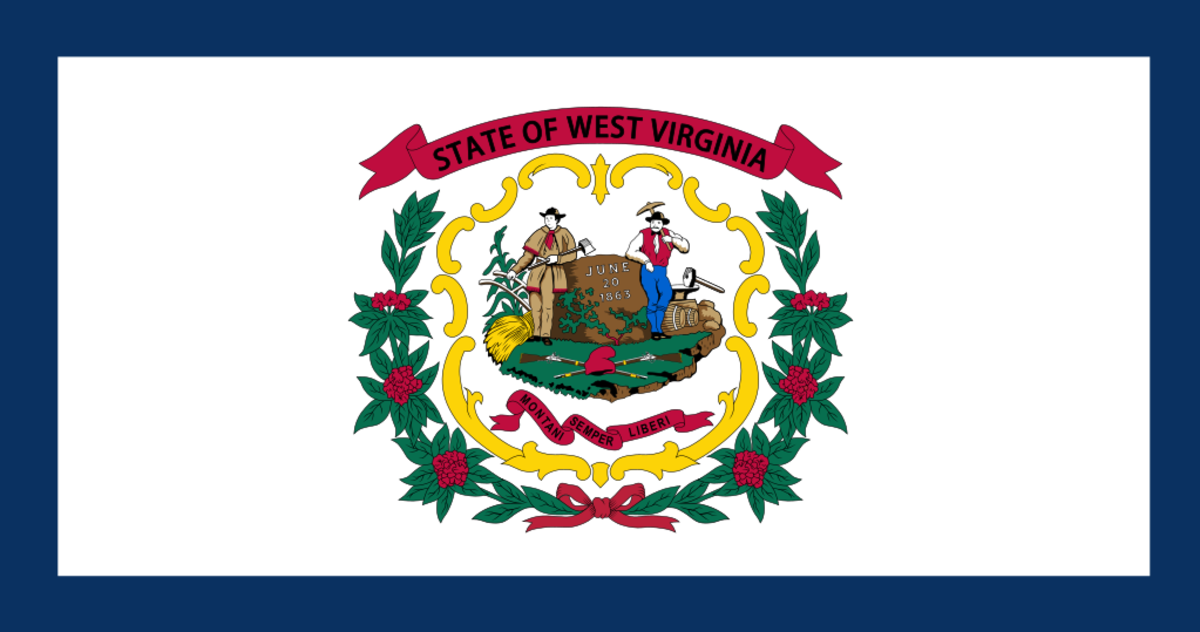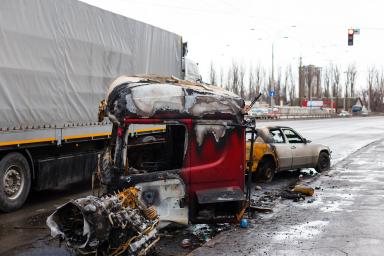Nationwide truck accident figures for 2020 and 2021 show how dangerous road crashes are in West Virginia. In 2020, NHTSA’s National Center for Statistics and Analysis reported that 370 large trucks were involved in fatal truck accidents, which killed 32 people. The death figures grew the following year. Data from the Federal Motor Carrier Safety Administration’s Motor Carrier Management Information System (MCMIS) showed that truck accidents in the state rose by 13.75% in 2021. The increase is equivalent to 45 lives lost, as shown in the National Safety Council's analysis of the 2021 statistics from the National Highway Traffic Safety Administration's (NHTSA) Fatality Analysis Reporting System (FARS).
Several personal injury law firms suggest that fatigued driving, impaired driving, distracted driving, overloading, and speeding are some of the most common causes of truck accidents in the state. A review of NHTSA accident figures between 2000 and 2019 showed that some of West Virginia’s deadliest five-mile stretches include Interstate 81 in Martinsburg, Interstate 77 near Princeton, US Route 60 in South Charleston, West Virginia Route 16 in Beckley, and Interstate 64 near Beckley.
To significantly reduce accidents, injuries, and fatalities involving commercial motor vehicles and trucks, the West Virginia state government has enacted laws that restrict unsafe driving behaviors. These laws are enforced alongside FMCSA regulations. This article goes through the traffic laws governing the state's trucking industry. It also contains information on the minimum insurance requirements and personal injury responsibility rules for West Virginia truckers, trucking businesses, crash victims, and accident plaintiffs.
West Virginia Commercial Driver's License Laws
People must obtain a commercial driver’s license (CDL) before operating commercial vehicles in West Virginia. The state has adopted the rules on classifying, testing, and licensing commercial vehicle drivers under the Federal Commercial Motor Vehicle Safety Act of 1986.
In West Virginia, bona fide farmers, farm vehicle drivers, and off-road construction and mining equipment operators are exempt from obtaining a CDL. Rules also disqualify the following from holding a CDL:
Habitual users of alcoholic beverages
Individuals whom the Commissioner of Motor Vehicles has identified as being hazardous to public safety or welfare when operating a motor vehicle
People without proof of financial responsibility
Disqualified CMV drivers in any state or jurisdiction
Additionally, the following table shows the violations that may result in license disqualification.
West Virginia Impaired Driving, Open Container, and Implied Consent Laws
Driving while impaired by alcohol, drugs, or controlled substances is illegal in West Virginia. A commercial driver can be prosecuted for driving under the influence (DUI) if their blood alcohol content (BAC) exceeds 0.04%, rather than the legal limit of 0.08% for regular motorists. Alcohol affects vision, coordination, judgment, and reaction time. It causes serious driving errors, such as driving recklessly or in the wrong lane. Intoxicated drivers involved in a car crash that leads to the death of another person due to a reckless disregard for the safety of others may face felony charges. According to the NHTSA, 65 drunk driving deaths occur in West Virginia on average annually.
In addition, West Virginia's open container law states that it is unlawful for a vehicle operator or passenger to deliberately keep any open alcoholic beverage container in the passenger area of their motor vehicle while on a public highway or right-of-way of a public roadway in this state, whether the vehicle is in motion or at rest.
Law enforcement is also cracking down on drunk drivers who refuse to be tested for alcohol when stopped or investigated for DUI. The implied consent statute in West Virginia states that holders of a driver's license are presumed to have consented to a blood or breath test.
West Virginia Drowsy Driving Law and Hours of Service Regulations
West Virginia is one of the states that does not have legislation expressly addressing fatigued drivers who cause injury or death. However, commercial motor vehicle drivers in the state are governed by the FMCSA's hours of service (HOS) regulations. The National Safety Council has indicated that being awake for more than 20 hours is equivalent to driving with a blood-alcohol concentration of 0.08%, making fatigued drivers as dangerous as intoxicated drivers.
The following table shows the HOS rules for property-carrying CMV drivers, including operators of 18-wheelers.
When experiencing adverse driving conditions, drivers can extend the 11-hour maximum driving limit and 14-hour driving window by up to two hours.
Drivers who violate the above-mentioned restrictions are removed from the road. As part of the penalty, they cannot resume driving until they have fulfilled the off-duty requirement. They may face fines if they have received several tickets for the same offense. Truck drivers and trucking businesses that violate hours-of-service regulations may be held accountable for any injuries or deaths resulting from their negligence in a crash. Victims are eligible for compensation if the truck driver caused the accident after staying on duty longer than the federal rules allow.
West Virginia Distracted Driving Law and Texting Ban
Distracted driving in West Virginia is illegal. Truck drivers are obliged to avoid doing any activity that takes their attention away from safe driving, such as using a phone, eating, drinking, or manipulating a navigation system. According to the NHTSA, texting is the most alarming distraction. Composing, sending, or reading a text takes a driver's eyes off the road for 5 seconds, which at 55 mph is the equivalent of traveling a whole football field with their eyes closed.
The state has enacted the cell phone and texting ban while driving as a primary law, punishing drivers who use a cell phone without hands-free technology while operating a motor vehicle. The WV Division of Motor Vehicles revealed that between 2016 and 2020, an annual average of 279 fatal motor vehicle crashes occurred on the state’s roadways. Violating the state’s distracted driving laws can result in a maximum $300 fine plus court costs and demerit points on driver’s license records, depending on the level of offense. Road users harmed due to the negligence of distracted drivers may file claims or lawsuits to recover compensation for their losses.
West Virginia Basic Speeding Laws and Absolute Speed Limits
West Virginia's basic speeding law requires commercial vehicle and truck drivers to always drive at a safe speed. They are prohibited from operating a vehicle at speeds greater than "reasonable under the existing conditions and the actual and potential hazards." They are also required to slow down when approaching curves, hillcrests, railroad crossings, or other hazards, as well as when the conditions of the roads change due to weather or time of day. The table shows the absolute speed limits for motor vehicle operators, including truckers, in West Virginia.
Violators may face a speeding ticket with a maximum punishment of $500 and up to six months in jail. However, if a truck driver exceeds the speed limit and endangers other road users, they may be charged with reckless driving. If their reckless driving causes the death of another person, they may be prosecuted for vehicular homicide, which carries a potential $1,000 fine, a one-year jail sentence, and a one-year license revocation.
West Virginia Loading and Securing Cargo Regulations
Truckers in West Virginia are required to ensure that their cargoes are properly loaded before traveling to avoid dropping or leaking onto the roads. They must also ensure that their freight does not exceed the legal limits. Some of the consequences of overloaded trucks include difficulty ascending inclines, increased velocity while moving downhill, and loss of control while steering, which can lead to a traffic accident. Truck drivers, trucking companies, or third-party cargo loaders can be held liable for the resulting collision.
The weight limits for commercial motor vehicles traveling on interstate highways are shown in the table below.
The legal weight limits on West Virginia routes and local service routes can be accessed on the Department of Transportation website.
West Virginia Commercial Trucking Insurance Requirements
West Virginia law requires all registered vehicles, whether they’re for personal or business use, to be insured. CMV drivers must always carry proof of insurance in their vehicle at all times. The minimum insurance requirements in the state include:
$25,000 bodily injury liability per person
$50,000 bodily injury liability per accident
$25,000 property damage liability
Vehicle operators are also required to have uninsured motorist coverage with the mandatory minimum limits of:
$25,000 for bodily injury or death of one person in an accident caused by an uninsured driver;
$50,000 for total bodily injury or death in an accident caused by an uninsured driver; and
$25,000 for property damage per accident caused by an uninsured driver.
State law requires that all insurers offer higher optional limits of uninsured motorist coverage and provide the option to purchase underinsured motorist coverage.
Tractor-trailers and semi-trucks with West Virginia Department of Transportation serial digits are required to have additional liability coverage, depending on their type and purpose. Owners or operators can check if they need the additional requirements by verifying their USDOT number or docket number with the FMCSA.
West Virginia follows the FMCSA's financial responsibility rules for interstate trucking. The following public liability insurance covers property damage, bodily injury, freight damage, medical costs, and more:
Insurance agents or providers of trucking operators are required by the US Department of Transportation and the state government to submit the necessary forms, including BMC-91 and MCS-90, within the deadline. Applicants may find more information about the insurance filing requirements on the FMCSA website.
How Much Can Someone Sue for a Truck Accident in West Virginia?
There are studies that suggest the average personal injury case settlement ranges from $3,000 to $75,000. However, in some personal injury cases, such as truck accidents, settlements can reach millions of dollars, especially when catastrophic injuries are involved. Numerous factors, such as the injuries sustained, responsibility, and insurance policy limits, can all have an impact on a case.
Contacting an expert personal injury lawyer is the best way for an accident victim to learn what they may be entitled to. They can obtain assistance in accurately determining current and predicted future costs for addressing their injuries. Lawyers can also help victims prove the negligent party's carelessness with compelling evidence in order to recover future damages such as future medical costs, lost earnings, and pain and suffering. At-fault parties in truck accidents may include the truck driver, the trucking business, the cargo loader, or the manufacturer of a faulty truck component.
West Virginia Statute of Limitations for Truck Accidents
The statute of limitations for truck accident victims in West Virginia is two years. They must file a personal injury or property damage case against the negligent party in the state's civil court system within the time limit specified from the time the incident happened. Meanwhile, the families of victims who died in a truck accident have a two-year limit to submit a wrongful death claim. Counting begins on the date of the victim’s death. If the deadline is not met, the victims will be unable to obtain compensation for their losses. However, there are exceptions to the state's rules. If a wounded victim is a minor, the statute of limitations begins when they reach the age of 18. This means that if a 10-year-old child is harmed in a tractor-trailer accident, the statute of limitations starts once they turn 18 and ends when they reach 20.
West Virginia Is a Fault State for Insurance Claims
When it comes to financial responsibility for losses in a motor vehicle accident, West Virginia has a fault-based insurance structure. It does not employ a "no-fault" insurance system in which claimants can expect an insurance payout for vehicle repairs and injuries regardless of who was at fault in a mishap. If a car driver is wounded or their vehicle is badly damaged in an accident caused by a truck driver, they can use one of the following actions to seek compensation:
File a subrogation claim against the at-fault driver's insurance company
Lodge a personal injury case against the at-fault driver in civil court
Initiate a third-party claim with the at-fault driver's insurer
Losses that exceed the coverage limitations of the personal injury protection (PIP) policy would allow the wounded victims to follow the procedures and file a lawsuit against the accountable party to seek further compensation. Victims can sue the at-fault party for a variety of damages, including lost earnings, pain and suffering, medical costs, and punitive damages that go above the other party's policy limits under the at-fault system.
West Virginia Is a Modified Comparative Fault State for Trucking Accident Lawsuits
In the case of trucking accidents, West Virginia follows a modified comparative fault rule. According to the state's Code Section 55-7-13c, victims can only get financial compensation if their level of liability in the accident is less than that of the other party or parties involved. Claimants found to be more than 50% at fault for the collision will not be compensated.
Average Settlement for West Virginia Trucking Accident Lawsuits
If a plaintiff files a claim against a truck driver or a trucking company under the state's modified comparative fault legislation, they will only be compensated for their proportionate share of liability. For instance, if a jury or judge finds that the total damages award for an injured victim who was found to be 30% at fault for the accident is $2,000,000, the injured person will only receive 70% of that amount, or $1,400,000.
Plaintiffs should seek the assistance of an experienced truck accident attorney to prove that the other party was more liable for the accident. Some attorneys provide representation on a contingency basis. A contingency fee agreement calls for the plaintiff to pay no legal fees until the lawyer obtains a financial settlement.
Legal Resources for West Virginia Trucking Accident Victims
West Virginia Lawyer Referral Service
The West Virginia Lawyer Referral Service is a public service that connects customers with skilled, local lawyers who have handled cases similar to theirs. Truck accident victims can utilize the site to locate personal injury attorneys who can assist them in recovering compensation for their injuries and pain and suffering. Those in need of legal counsel can schedule a 30-minute consultation with a lawyer for $25 or less.
West Virginia Offices of the Insurance Commissioner Complaint Form
Citizens in West Virginia who believe their insurance claim or policy has been delayed, wrongfully denied, intentionally underpaid, or poorly managed by insurance agents, providers, or adjusters may submit a complaint with the Offices of the Insurance Commissioner and ask for an investigation. If a claim for insurance benefits is involved, whether from the complainant's own company or that of another party, a detailed statement of facts must be included. Policyholders can also look through the state's various insurance brochures.
FMCSA Insurance FAQs
Commercial vehicle operators, owners, and drivers can learn more about the Federal Motor Carrier Safety Administration's insurance rules and requirements by reviewing the list of frequently asked questions on the agency's website.
Request a Vehicle Crash Report
People involved in commercial vehicle or truck accidents in West Virginia who are trying to obtain a crash report must submit a completed crash report request form to the West Virginia State Police Traffic Safety Section.
Step into the world of Expertise.com, your go-to hub for credible insights. We don't take accuracy lightly around here. Our squad of expert reviewers, each a maestro in their field, has given the green light to every single article you'll find. From rigorous fact-checking to meticulous evaluations of service providers, we've got it all covered. So feel free to dive in and explore. The information you'll uncover has been stamped with the seal of approval by our top-notch experts.





